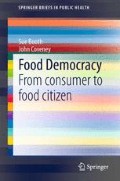Abstract
This chapter will explore two key areas. Firstly, we complete our examination of food democracy in action (See Chap. 4, Fig. 4.1) and explore how food democracy operates in practice more broadly such as alliances, movements and advocacy structures. Then, we examine the politics of transforming the food supply, reflecting on the nature of democratic citizenship and the practical strategies that foster it. At the individual, household and community level, there is a degree of control consumers can exert, for example by making individual choices about where they buy food. But does food democracy have further potential to exert influence more widely? What are the possibilities for transformative food system action on a bigger scale?
Access this chapter
Tax calculation will be finalised at checkout
Purchases are for personal use only
References
Bandura A (1997) Self-efficacy in changing societies. Cambridge University Press, Cambridge
DoSomething! (2014a) FoodWise—the campaign [Online]. Available http://www.foodwise.com.au/about-foodwise/the-campaign/. Accessed 12 July 2014
DoSomething! (2014b) Homepage [Online]. Available http://dosomething.net.au/. Accessed 12 July 2014
Foster-Fishman PG, Cantillon D, Pierce SJ, Egeren LV (2007) Building an active citizenry: the role of neighbourhood problems, readiness and capacity for change. Am J Community Psychol 39:91–106
Foster-Fishman PG, Fitzgerald K, Brandell C, Nowell B, Chavis DM, Egeren LV (2006) Mobilising residents for action: the role of small wins and strategic supports. Am J Community Psychol 38:143–152
Foster-Fishman PG, Pierce MS, Egeren LV (2009) Who participates and why: building a process model of citizen participation. Health Educ Behav 36(3):550–569
Hanna FJ (2002) Therapy with difficult clients: using precursors model to awaken change. American Psychological Association, Washington DC
Hassanein N (2003) Practising food democracy: a pragmatic politics of transformation. J Rural Stud 19:77–86
Higgins W, Ramia G (2000) Social citizenship. In: Hudson W, Kane J (eds) Rethinking Australian citizenship. Cambridge University Press, Cambridge
Kriflik L (2006) Consumer citizenship: acting to minimise environmental health risks related to the food system. Appetite 46:270–279
Moore-Lappe F (2007) Doing Democracy—Ten practical arts. [Online] Available: http://www.smallplant.org/democratic-life/living-democracy. Accessed 12 July 2014
Perkins DD, Florin P, Rich RC, Wandersman A, Chavis D (1990) Participation and the social and physical environment of residential blocks: crime and community context. Am J Community Psychol 18:83–115
Scally G (2013) Adulteration of food: what it doesn’t say on the tin. Brit Med J 346:1–2
Scrinis G (2007) From techno-corporate food to alternative agri-food movements. Local Glob Identity Secur Community 4:112–140
Stevenson GW, Ruhl K, Lezberg S, Clancy K (2007) Warrior, builder and weaver work. In: Hinrichs CC, Lyson T (eds) Remaking the North American food system: strategies for sustainability. University of Nebraska, USA
Thackeray R, Hunter MA (2010) Empowering youth: use of technology in advocacy to affect social change. J Comput Mediated Commun 15(4):575–591
Thomson JS, Abel J, Maretzki A (2001) Edible connections: a model for citizen dialogue used to discuss local food, farm and community issues. J Appl Commun 85(1):25–41
Author information
Authors and Affiliations
Corresponding author
Rights and permissions
Copyright information
© 2015 The Author(s)
About this chapter
Cite this chapter
Booth, S., Coveney, J. (2015). Democracy at Work—From Consumers to Food Citizens. In: Food Democracy. SpringerBriefs in Public Health. Springer, Singapore. https://doi.org/10.1007/978-981-287-423-8_6
Download citation
DOI: https://doi.org/10.1007/978-981-287-423-8_6
Published:
Publisher Name: Springer, Singapore
Print ISBN: 978-981-287-422-1
Online ISBN: 978-981-287-423-8
eBook Packages: MedicineMedicine (R0)

